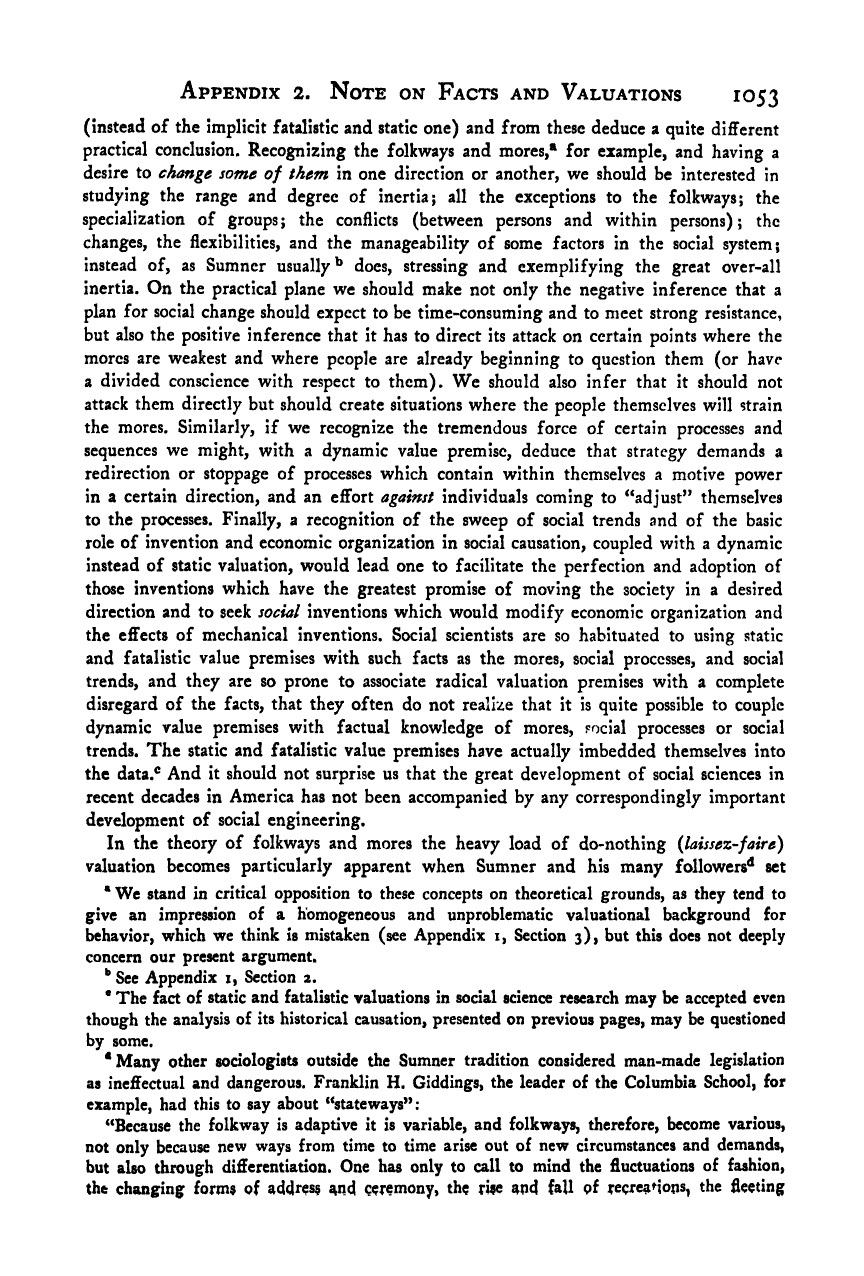Note: Gunnar Myrdal died in 1987, less than 70 years ago. Therefore, this work is protected by copyright, restricting your legal rights to reproduce it. However, you are welcome to view it on screen, as you do now. Read more about copyright.
Full resolution (TIFF) - On this page / på denna sida - Appendices - 2. A Methodological Note on Facts and Valuations in Social Science - 3. The History and Logic of the Hidden Valuations in Social Science

<< prev. page << föreg. sida << >> nästa sida >> next page >>
Below is the raw OCR text
from the above scanned image.
Do you see an error? Proofread the page now!
Här nedan syns maskintolkade texten från faksimilbilden ovan.
Ser du något fel? Korrekturläs sidan nu!
This page has never been proofread. / Denna sida har aldrig korrekturlästs.
Appendix 2. Note on Facts and Valuations 1053
(instead of the implicit fatalistic and static one) and from these deduce a quite different
practical conclusion. Recognizing the folkways and mores,* for example, and having a
desire to change some of them in one direction or another, we should be interested in
studying the range and degree of inertia; all the exceptions to the folkways; the
specialization of groups; the conflicts (between persons and within persons); the
changes, the flexibilities, and the manageability of some factors in the social system;
instead of, as Sumner usually’* does, stressing and exemplifying the great over-all
inertia. On the practical plane we should make not only the negative inference that a
plan for social change should expect to be time-consuming and to meet strong resistance,
but also the positive inference that it has to direct its attack on certain points where the
mores are weakest and where people are already beginning to question them (or have
a divided conscience with respect to them). We should also infer that it should not
attack them directly but should create situations where the people themselves will strain
the mores. Similarly, if we recognize the tremendous force of certain processes and
sequences we might, with a dynamic value premise, deduce that strategy demands a
redirection or stoppage of processes which contain within themselves a motive power
in a certain direction, and an effort against individuals coming to “adjust” themselves
to the processes. Finally, a recognition of the sweep of social trends and of the basic
role of invention and economic organization in social causation, coupled with a dynamic
instead of static valuation, would lead one to facilitate the perfection and adoption of
those inventions which have the greatest promise of moving the society in a desired
direction and to seek social inventions which would modify economic organization and
the effects of mechanical inventions. Social scientists are so habituated to using static
and fatalistic value premises with such facts as the mores, social processes, and social
trends, and they are so prone to associate radical valuation premises with a complete
disregard of the facts, that they often do not realize that it is quite possible to couple
dynamic value premises with factual knowledge of mores, Focial processes or social
trends. The static and fatalistic value premises have actually imbedded themselves into
the data.® And it should not surprise us that the great development of social sciences in
recent decades in America has not been accompanied by any correspondingly important
development of social engineering.
In the theory of folkways and mores the heavy load of do-nothing {laissez-faire)
valuation becomes particularly apparent when Sumner and his many followers^* set
* We stand in critical opposition to these concepts on theoretical grounds, as they tend to
give an impression of a homogeneous and unproblematic valuational background for
behavior, which we think is mistaken (see Appendix i, Section 3), but this does not deeply
concern our present argument.
**
See Appendix i, Section 2.
® The fact of static and fatalistic valuations in social science research may be accepted even
though the analysis of its historical causation, presented on previous pages, may be questioned
by some.
*Many other sociologists outside the Sumner tradition considered man-made legislation
as ineffectual and dangerous. Franklin H. Giddings, the leader of the Columbia School, for
example, had this to say about “stateways”:
“Because the folkway is adaptive it is variable, and folkways, therefore, become various,
not only because new ways from time to time arise out of new circumstances and demands,
but also through differentiation. One has only to call to mind the fluctuations of fashion,
the changing forms of address ^nd ceremony, the rise and fall of recreations, the fleeting
<< prev. page << föreg. sida << >> nästa sida >> next page >>